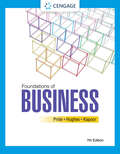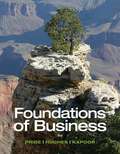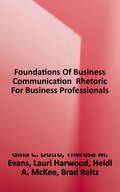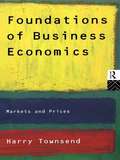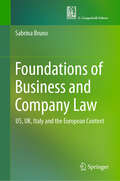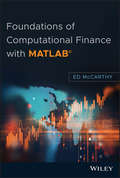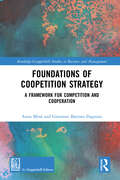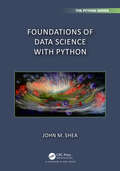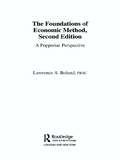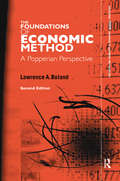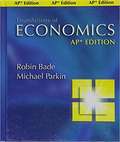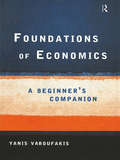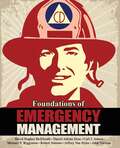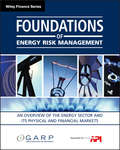- Table View
- List View
Foundations of Blockchain: The pathway to cryptocurrencies and decentralized blockchain applications
by Koshik RajReaders should be comfortable with general security terms, but no knowledge of cryptography or decentralized application is assumed. Although the book begins with all the basic concepts, a hands-on python programming, and theoretical networking knowledge, would speed up the reading process.
Foundations of Business
by Jack R. Kapoor Robert J. Hughes William M. PrideGain the understanding of business to become a better employee, more informed consumer and even a successful business owner with Pride/Hughes/Kapoor's FOUNDATIONS OF BUSINESS, 6E. Every feature has been evaluated by experienced instructors and business students, like you. New applications and activities guide you in applying important concepts. This up-to-date edition highlights business ownership, management and organization, human resources, marketing, e-business, information systems, accounting and finance. You study ethics and social responsibility, small business and entrepreneurship and global issues. Cutting-edge content also emphasizes social media, international business, green and socially responsible business and sustainability. MindTap online resources help you further master important concepts and succeed in today's competitive business world and in your personal life.
Foundations of Business
by Jack R. Kapoor Robert J. Hughes William M. PrideAuthors Pride/Hughes/Kapoor believe that success is measured not only by the grade you receive in this course, but also by how the information in this book helps you build a foundation for a better life. That’s what FOUNDATIONS OF BUSINESS, 7E is all about. Updates highlight the specific challenges facing businesses and individuals, particularly following the global pandemic. The latest content, real examples and powerful new cases show you how to become a better employee, more informed consumer and successful business owner. You examine issues within the economy, business ownership, management, human resources, marketing, social media, e-commerce, management information systems, accounting and finance. You also learn how cultural diversity, ethics and social responsibility, small business and entrepreneurship and environmental concerns impact both the nation’s economy and you, as an individual consumer. MindTap and Infuse digital resources are also available.
Foundations of Business
by Mandy LangeAs part of the Skills for Life CTE Series, Foundations of Business prepares students for the global business environment by exploring themes of economics, leadership, marketing, financial management, and employment. Students use what they learn in each of these units to create a comprehensive business plan portfolio demonstrating a practical business idea. Business management, administration, finance, and marketing careers are spotlighted throughout the book to introduce students to real-world employment opportunities. Students also learn how to plan for a career and develop employability skills critical to domestic and international business. In addition, chapter exercises provide key terms and assessments to help students become successful in any business environment.
Foundations of Business (Fourth Edition)
by Robert Hughes Jack Kapoor William PrideFOUNDATIONS OF BUSINESS, 4E gives readers the comprehensive preparation they'll need to succeed in today's competitive business world. By providing a brief survey of business, including management and organization, marketing, social media and e-business, information systems, accounting, and finance, this text introduces the reader to core business practices. In addition, the authors address other important concepts such as ethics and social responsibility, forms of ownership, small business concerns and entrepreneurship, and international business. This edition is filled with cutting-edge content, including up-to-date information on the economic crisis, social networking, competition in the global marketplace, and the green movement, as well as suggestions on how to manage a business in the midst of economic ups and downs. An abundance of study aids also is available within the text and on the student companion website to help you achieve success in the course and in today's competitive business world.
Foundations of Business Communication: Rhetoric for Business Professionals
by Lauri Harwood Heidi A. McKee Gina C. Dutro Theresa M. Evans Brad ReitzFoundations of Business Communication: Rhetoric for Business Professionals, was written by the faculty of BUS 102 to provide a resource to help you in BUS 102, in your other FSB courses, and in your professional career. - Chapter 2: Business Communication Today explains the importance of effective communication in today's globally networked workplace and defines the characteristics of effective business communication. - Chapter 3: Rhetoric in Business Communication introduces the key concepts and strategies of rhetoric, the art and practice of effective communication. You will learn how to analyze the rhetorical situation of business communication so that you can craft effective messages appropriate for your purpose, audience, and context. - Chapter 4: Delivering Oral Communications examines the rhetoric of oral delivery, strategies for organizing oral communications, and design tips for presentation visuals. The primary focus is on extemporaneous presentations, but oral communications in other business contexts are also considered. - Chapter 5: Developing Business Relationships explains how to introduce yourself within business communities and how to frame requests that establish goodwill with your audience(s). This chapter also has tips for writing business emails. - Chapter 6: Business Communication Processes provides guidelines for the composing process for a variety of oral and written communications. - Chapter 7: Planning for the Job Search offers an overview of the job search communication process, from locating position announcements and networking to interviewing and job acceptance communications. - Chapter 8: Writing Cover Letters has information and advice on how to write a cover letter that will stand out to prospective employers. The assignment scenario focuses on opportunities available to early career college students, and from this project many students have found excellent summer internships and jobs. - Chapter 9: Collaborating and Communicating as a Team builds from the work on collaboration begun in BUS 101 and delves into the specifics of how to research, write, and present as a team. - Chapter 10: Reporting Your Findings examines the structure of formal recommendation reports and provides foundational strategies for how to narrate and represent qualitative and quantitative data. - Chapter 11: Making Recommendations explains how to deliver credible recommendations in writing and orally that are clear, concise, and thorough. - Chapter 12: Looking Back, Moving Forward covers the importance of reflective analysis for transferring learning from your first-year experiences into FSB's upper division core and major courses and on into your professional careers.
Foundations of Business Economics: Markets and Prices
by Harry TownsendFoundatioins of Business Economics explains microeconomic analysis in terms of real business situations. The underlying theme of the book is the way in which markets link together interdependent activities and how they confront and solve problems of information. The book covers a wide range of issues, including *The economic way of thinking *The Business environment *Product markets *Market failure *Factor markets *General equilibrium Theory is developed carefully but with a light touch and mathematics kept to a minimum, making the book easily accessible. It will be particularly valuable for those students whose interests lie on the human side of industry. explanation of microeconomic analysis in terms of real business practice. The author examines the way markets link together interdependent economic activities and provides general equilibrium models of the entire economic system.
Foundations of Business Law and the Legal Environment
by Jethro K. Lieberman Don Mayer Daniel M. Warner George J. SiedelMayer, Warner, Siedel and Lieberman's Foundations of Business Law and the Legal Environment is an up-to-date textbook with comprehensive coverage of legal and regulatory issues for your introductory Legal Environment or Business Law course. The text is organized to permit instructors to tailor the materials to their particular approach. The authors take special care to engage students by relating law to everyday events with which they are already familiar with their clear, concise and readable style. Business Law and the Legal Environment provides students with context and essential concepts across a broad range of legal issues with which managers and business executives must grapple. The text provides the vocabulary and legal savvy necessary for business people to talk in an educated way to their customers, employees, suppliers, government officials -- and to their own lawyers. With Foundations of Business Law and the Legal Environment, the authors have created a text that not only has both case summaries and excerpted cases, but one that you can easily customize by deleting chapters, reordering the content, adding your own material, and even editing at the line level with Flat World's easy-to-use MIYO (Make It Your Own) Platform.
Foundations of Business Thought
by Calvin Boardman Alan Sandomir Harris SondakNow published by Sage Foundations of Business Thought, Ninth Edition presents the writings of great contemporary and historical thinkers in an effort to develop the conceptual foundation for commercial activity in general and the ideals of accounting, finance, management, marketing, and operations/production in particular. This unique approach of using classical works of authorship reinforces the importance of clear, critical, and integrative thinking. Since 1993, many thousands of students across the United States have been introduced to the world of commerce and business through a process that makes business concepts at once understandable and intimately personal. Business is presented as a series of human connections designed to address the personal needs and wants of individuals based on sets of values and codes of ethics that guide our thoughts and actions in a market setting. Business techniques and tools may change over time but the essential goals and concepts of commercial activity remain unchanged across both geography and time. Inspired by a four volume set of books produced by the Harvard Business School in 1962, entitled The World of Business, this course and the book upon which it rests present the writings of great contemporary and historical thinkers in order to develop the conceptual foundation for commercial activity in general and the ideals of accounting, finance, management, marketing and operations/production in particular. This unique approach of using classical works of authorship reinforces the importance of clear, critical and integrative thinking. These works first outline the motivations for the development of commercial activity and, then, present the fundamental elements important to the foundation of a commercial society. These foundational concepts are followed by sections devoted to the various functional areas of business, again introduced by classical works that have both passed the test of time and provide unique insights into each of the areas. Faculty are provided with detailed instructions on methods of relating the material to contemporary business concepts and practice. While this roadmap provides structure for the material, faculty are encouraged to take advantage of their individual specialization and creativity. This could end up being one of the most enjoyable courses a faculty member will teach. Students are encouraged to be critical of the readings, of the concepts and, most particularly, their own notions about business and, at the same time, open to new ideas, the thoughts of others and the opportunities for personal growth. Through careful reading of the text, participating in classroom discussions, expanding knowledge through individual research and by writing position papers on contemporary business topics, this course has the potential to be one of the most impactful undergraduate or graduate courses students will take in their college career.
Foundations of Business Thought
by Calvin Boardman Alan Sandomir Harris SondakNow published by Sage Foundations of Business Thought, Ninth Edition presents the writings of great contemporary and historical thinkers in an effort to develop the conceptual foundation for commercial activity in general and the ideals of accounting, finance, management, marketing, and operations/production in particular. This unique approach of using classical works of authorship reinforces the importance of clear, critical, and integrative thinking. Since 1993, many thousands of students across the United States have been introduced to the world of commerce and business through a process that makes business concepts at once understandable and intimately personal. Business is presented as a series of human connections designed to address the personal needs and wants of individuals based on sets of values and codes of ethics that guide our thoughts and actions in a market setting. Business techniques and tools may change over time but the essential goals and concepts of commercial activity remain unchanged across both geography and time. Inspired by a four volume set of books produced by the Harvard Business School in 1962, entitled The World of Business, this course and the book upon which it rests present the writings of great contemporary and historical thinkers in order to develop the conceptual foundation for commercial activity in general and the ideals of accounting, finance, management, marketing and operations/production in particular. This unique approach of using classical works of authorship reinforces the importance of clear, critical and integrative thinking. These works first outline the motivations for the development of commercial activity and, then, present the fundamental elements important to the foundation of a commercial society. These foundational concepts are followed by sections devoted to the various functional areas of business, again introduced by classical works that have both passed the test of time and provide unique insights into each of the areas. Faculty are provided with detailed instructions on methods of relating the material to contemporary business concepts and practice. While this roadmap provides structure for the material, faculty are encouraged to take advantage of their individual specialization and creativity. This could end up being one of the most enjoyable courses a faculty member will teach. Students are encouraged to be critical of the readings, of the concepts and, most particularly, their own notions about business and, at the same time, open to new ideas, the thoughts of others and the opportunities for personal growth. Through careful reading of the text, participating in classroom discussions, expanding knowledge through individual research and by writing position papers on contemporary business topics, this course has the potential to be one of the most impactful undergraduate or graduate courses students will take in their college career.
Foundations of Business and Company Law: US, UK, Italy and the European Context
by Sabrina BrunoThis textbook focuses on the interrelationships between economic elements and legal principles with regard to business and company law. Three jurisdictions are taken into consideration: US, UK, and Italian law (the last of which was chosen as a “prototype” of continental European legal systems). The economic elements underlying business and company law are actually common to the three legal systems and, consequently, their legal principles and rules are similar despite one jurisdiction (namely, Italy) being based on civil law and the other two on common law. Their similarities are also due to the historical origins of the legal instruments that are covered by the book: partnership law dates back to the Romans, while company law can be traced back to English law. Roman law and English law have influenced, respectively, partnership law and company law around the globe. The book addresses the following topics: proprietorship law, partnership law and company law. For each topic, it first identifies the economic and legal elements that are shared by the three jurisdictions, then explores each one separately to highlight the differences. The textbook is based on over thirty years of research on business and company law conducted by the author in Italy, the UK and US and more than fifteen years of teaching this subject to international students at Luiss G. Carli University of Rome as part of its Bachelor of Economics and Business program.
Foundations of Career Counseling: A Case-Based Approach (First Edition)
by Suzanne M. DuggerThis text is designed for professors and counselor-educators interested in finding ways to excite graduate students about the theory and practice of career counseling. <P><P>This text uses a case-based approach to engage students in the study of what can sometimes be rather dry content.
Foundations of Computational Finance with MATLAB
by Ed McCarthyGraduate from Excel to MATLAB® to keep up with the evolution of finance data Foundations of Computational Finance with MATLAB® is an introductory text for both finance professionals looking to branch out from the spreadsheet, and for programmers who wish to learn more about finance. As financial data grows in volume and complexity, its very nature has changed to the extent that traditional financial calculators and spreadsheet programs are simply no longer enough. Today’s analysts need more powerful data solutions with more customization and visualization capabilities, and MATLAB provides all of this and more in an easy-to-learn skillset. This book walks you through the basics, and then shows you how to stretch your new skills to create customized solutions. Part I demonstrates MATLAB’s capabilities as they apply to traditional finance concepts, and PART II shows you how to create interactive and reusable code, link with external data sources, communicate graphically, and more. Master MATLAB’s basic operations including matrices, arrays, and flexible data structures Learn how to build your own customized solutions when the built-ins just won’t do Learn how to handle financial data and industry-specific variables including risk and uncertainty Adopt more accurate modeling practices for portfolios, options, time series, and more MATLAB is an integrated development environment that includes everything you need in one well-designed user interface. Available Toolboxes provide tested algorithms that save you hours of code, and the skills you learn using MATLAB make it easier to learn additional languages if you choose to do so. Financial firms are catching up to universities in MATLAB usage, so this is skill set that will follow you throughout your career. When you’re ready to step into the new age of finance, Foundations of Computational Finance with MATLAB provides the expert instruction you need to get started quickly.
Foundations of Coopetition Strategy: A Framework for Competition and Cooperation (Routledge-Giappichelli Studies in Business and Management)
by Giovanni Battista Dagnino Anna MinàThis book disentangles the foundations of coopetition (i.e., concurrent competition and cooperation) by exploring in-depth the intellectual legacy of Eastern and Western perspectives. In particular, it detects the foundations of coopetition in three Chinese streams of thought; Confucianism, Taoism, and Legalism, and in five Western schools of thought; David Hume, Adam Smith, Immanuel Kant, Georg Wilhelm Frederich Hegel and Søren Kierkegaard. In such a way, it unveils four logics used to tackle the essence of coopetition, respectively either/or, both/and, both/or, and either/and. The key objectives of the book are: firstly, to adopt a paradoxical lens to investigate the foundations of coopetition strategy. Secondly, to offer an interpretive framework that detects the different forms, tactics and patterns of coopetition. Thirdly, to discuss the implications of the framework proposed for other paradoxical strategies and to distil a bouquet of managerial implications. In such a way, the volume combines existing foundational perspectives with a contemporary interpretation of the coopetition phenomenon, thereby offering a valuable understanding of the current business and management world. The guiding principles of the book enable readers to extricate the dichotomy between the phenomenon of coopetition and coopetitive strategy, appraise the rationale for distinguishing between deliberate (planned) coopetition strategy and emergent (unplanned, but conscious) coopetition strategy, and understand how to deal with coopetition tensions.
Foundations of Corporate Heritage
by John M. BalmerHeritage is increasingly recognised as a significant corporate concern, with corporate heritage brands and identities often forming an important part of a nation's patrimony. Foundations of Corporate Heritage explains the principles, processes, strategic significance – and challenges – of corporate heritage formation and management. This scholarly but accessible anthology includes seminal articles on the territory and also includes five new contributions with questions for study and reflection with students on executive/taught courses in mind. With contributions from the leading international experts in corporate heritage, this book examines the research foundations of the area and applications in practice. It will be important supplementary reading for students, practitioners and specialists in corporate marketing brand management and marketing communications, as well as tourism, hospitality and heritage studies.
Foundations of Data Science with Python (Chapman & Hall/CRC The Python Series)
by John M. SheaFoundations of Data Science with Python introduces readers to the fundamentals of data science, including data manipulation and visualization, probability, statistics, and dimensionality reduction. This book is targeted toward engineers and scientists, but it should be readily understandable to anyone who knows basic calculus and the essentials of computer programming. It uses a computational-first approach to data science: the reader will learn how to use Python and the associated data-science libraries to visualize, transform, and model data, as well as how to conduct statistical tests using real data sets. Rather than relying on obscure formulas that only apply to very specific statistical tests, this book teaches readers how to perform statistical tests via resampling; this is a simple and general approach to conducting statistical tests using simulations that draw samples from the data being analyzed. The statistical techniques and tools are explained and demonstrated using a diverse collection of data sets to conduct statistical tests related to contemporary topics, from the effects of socioeconomic factors on the spread of the COVID-19 virus to the impact of state laws on firearms mortality.This book can be used as an undergraduate textbook for an Introduction to Data Science course or to provide a more contemporary approach in courses like Engineering Statistics. However, it is also intended to be accessible to practicing engineers and scientists who need to gain foundational knowledge of data science.Key Features: Applies a modern, computational approach to working with data Uses real data sets to conduct statistical tests that address a diverse set of contemporary issues Teaches the fundamentals of some of the most important tools in the Python data-science stack Provides a basic, but rigorous, introduction to Probability and its application to Statistics Offers an accompanying website that provides a unique set of online, interactive tools to help the reader learn the material
Foundations of Deep Metaphors: How Managers Benefit from Discovering Consumer Similarities
by Gerald Zaltman Lindsay ZaltmanThis chapter introduces some of the social, psychological, physical, and neurological bases for the deep metaphors that can help managers better understand the hearts and minds of consumers.
Foundations of Dynamic Economic Analysis
by Michael R. CaputoPresenting a thorough introductory exposition of optimal control theory, this work differs from the existing textbooks on the subject due to its emphasis on the economic interpretation of the mathematics and the qualitative properties of the solutions. Moreover, it is a modern exposition of optimal control theory in that it presents numerous complementary methods. It is aimed at first-year and second-year PhD students in economics, agricultural and resource economics, operations research, management science, and applied mathematics.
Foundations of Economic Method: A Popperian Perspective
by Lawrence Boland Tom WarlowMany consider Foundations of Economic Method to be Lawrence Boland's best work. This updated edition is radically changed from the original and will be much appreciated by thinkers within economics. The book positions methodology vis-is the current practice of economists and is all the better for it. Yet another book that not only deserves to be r
Foundations of Economic Method: A Popperian Perspective, 2nd Edition
by Lawrence A. BolandMany consider Foundations of Economic Method to be Lawrence Boland's best work. This updated edition is radically changed from the original and will be much appreciated by thinkers within economics. The book positions methodology vis-à-vis the current practice of economists and is all the better for it. Yet another book that not only deserves to be read by those within the field of economic methodology, but also by those involved in economics at all. Boland is back.
Foundations of Economic Psychology: A Behavioral and Mathematical Approach
by Kazuhisa TakemuraThis book provides an overview of the concept of economic psychology from behavioral and mathematical perspectives and related theoretical and empirical findings. Economic psychology is defined briefly as a general term for descriptive theories to explain the psychological processes of microeconomic behaviors and macroeconomic phenomena. However, the psychological methodology and knowledge of economic psychology have also been applied widely in such fields as economics, business administration, and engineering, and they are expected to become increasingly useful in the future—a trend suggested in several eminent scholars’ studies.The book explains the numerous behavioral and mathematical models of economic psychology related to micro- and macroeconomic phenomena that have been proposed in the past, and introduces new models that are useful to explain human economic behaviors. It concludes with speculations about the future of modern economic psychology, referring to its connection with fields related to neuroscience, such as neuroeconomics, which have been developed in recent years.Readers require no advanced expertise; nonetheless, an introductory understanding of psychology, business administration, and economics, and a high- school-graduate level of mathematics are useful. To aid readers, each chapter includes a bibliography, which can be referred for more details related to economic psychology.
Foundations of Economics (AP Edition)
by Parkin Bade<p>Everyone agrees that they only way to learn economics is to do it. Rote memorization does not work. The keys to success in economics are active involvement and working problems. To help students succeed, the Bade/Parkin package is designed to encourage learning by doing. After all, practice makes perfect! <p>Practice is the cornerstone of the innovative Bade/Parkin approach. Each chapter of Foundations of Economics concentrates on a manageable number of core concepts. A full page Checkpoint--containing a Practice Problem with solution and a parallel Exercise--immediately follows each main idea. Checkpoints serve as stopping points and encourage students to practice using a concept before moving on. <p>Different learning styles need different learning tools, and eFoundations, Bade/Parkin's extensive web environment, puts students in the driver's seat and allows them to use technology in the way that suits them best.</p>
Foundations of Economics: A Beginner's Companion
by Yanis VaroufakisFoundations of Economics breathes life into the discipline by linking key economic concepts with wider debates and issues. By bringing to light delightful mind-teasers, philosophical questions and intriguing politics in mainstream economics, it promises to enliven an otherwise dry course whilst inspiring students to do well.The book covers all the main economic concepts and addresses in detail three main areas:* consumption and choice* production and markets* government and the State.Each is discussed in terms of what the conventional textbook says, how these ideas developed in historical and philosophical terms and whether or not they make sense. Assumptions about economics as a discipline are challenged, and several pertinent students' anxieties ('Should I be studying economics?') are discussed.
Foundations of Emergency Management
by Carl Jensen David Mcelreath Robert Nations Julie Nations Michael Wigginton Jeffrey M Van Slyke Adrian DossOn a daily basis, the United States, and the entire world in general, face the reality and responsibility of managing hazards, emergencies, and disasters. A disaster may strike at any time with little or no warning. Incidents may also occur with speed, surprise, and violence. Any location is vulnerable to some form of hazard. The 2020 COVID-19 outbreak is just one indication that dangers, often unanticipated, may impact an area, region, nation, or in the case of COVID-19, the global community. Thus, communities throughout the world must acknowledge the importance and relevance of emergency management with respect to an array of diverse threats. Foundations of Emergency Management highlights the importance of effective emergency management and provide a cumulative overview and introduction to the fundamental aspects of emergency management. Emergency management is a discipline of global importance. Foundations of Emergency Management examines the history, hazards, power, role, future, and other aspects of emergency management. To help the reader comprehend concepts covered, the publication includes learning objectives, numerous images / graphics, chapter summaries, key terms, references, and thought and discussion questions.
Foundations of Energy Risk Management
by GARPGARP's Fundamentals of Energy Risk Management introduces investors to the basic components and some of the basic terminology used in the energy industry. It covers the commodity cycle, energy use and sources, and various risk types, various energy products and the markets where energy is traded. It also introduces certain risk management fundamentals and real option thinking. The book is GARP's required text used by risk professionals looking to obtain their Certificate in Energy Risk Management.


